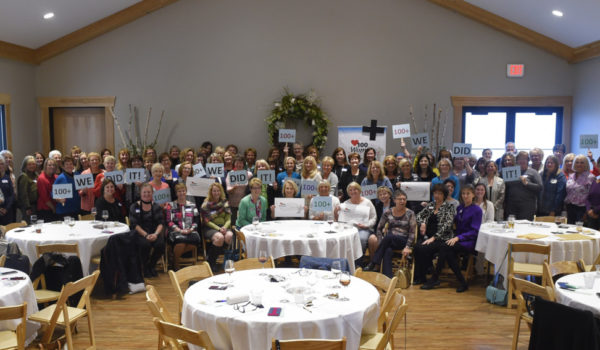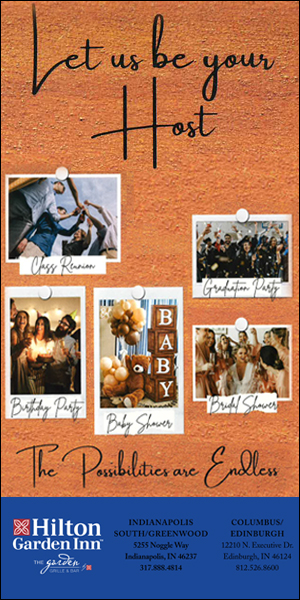
100+ Women Who Care gives grants to southside nonprofits
By Sara McAninch // Photography by Scott Roberson & submitted
Together they can do more for Johnson County than they can individually; that’s the foundation principle of 100+ Women Who Care. The members meet quarterly; during the meetings, participants select a nonprofit recipient located in the county that has a goal of bettering the community.
Each giving circle member commits $500 annually, with $100 going into a charitable fund for the future and the other $400 split up among the four recipient organizations (one per quarter). Membership renews on an annual basis. While these big-hearted women expect nothing in return, the joy they receive on seeing the impact of their philanthropy is motivation to be involved. It’s also a great way to make new friends.
“I’ve been able to connect with others through this group and develop strong friendships,” says Lisa Lintner, director at Johnson County Public Library, whose foundation was the recipient organization in December 2019.
Founded in December 2015 and officially launched in February 2016, the group had humble beginnings, with 48 members attending the first meeting. By the end of the year, it had grown to 86. Today, 25 of the original participants are on hand to celebrate the organization’s five-year anniversary with the other 94 women who make up the 2021 group.
The idea for a Johnson County all-female group was pitched by Carol Phipps, who had participated in a similar giving circle in her home state of Illinois. Eventually Phipps and two other women approached Gail Richards, president and CEO of the Johnson County Community Foundation. Its mission is to “connect people who care with causes that matter,” according to its website, and 100+ Women aligns with that mission perfectly.
“They knew I’d be interested because it connects all these women with causes they’re passionate about,” says Richards.
Global alliance
The 100+ Women Who Care Johnson County is one of 13 women-only Indiana chapters that are part of the international 100 Who Care Alliance. The goal is to have at least 100 participants in the community fundraising program.
“We were delighted, then, in 2017 that we exceeded that mark, and we officially changed our name to 100+ Women Who Care,” says Garnet Vaughan, one of the original members who is on the steering committee and also manages communications for the organization.
Due to growing membership, the women gave their first $10,000 grant in March 2017, just one year after forming. To date, they’ve given more than a quarter of a million dollars to nonprofits that range in scope from food pantries to equine-assisted learning activities to empowering victims of domestic violence and sexual assault, to name a few.
Structured engagement
Each year, the venue for the quarterly meetings changes, but it’s always located in Johnson County. At the beginning of each meeting, participants contribute $12, which goes toward the venue fee, hors d’oeuvres and beverages. There’s also a cash bar. The one-hour meetings start promptly at 5:30 p.m., but the doors open at 4:45 p.m. so the women can socialize and network.
Every member is expected to bring her checkbook to the meeting so she can write a $100 check on the spot to whichever nonprofit is chosen that night to receive the quarterly funds (and yes, it must be a check; credit cards or other forms of payment are not accepted). Prepaying for the year is another option.
“A member can prepay so she doesn’t have to bring a checkbook or even be there at the meeting to make her donations,” says Vaughan.
A large part of the meeting is nominations and presentations. During the nomination period, any member can submit a local nonprofit for consideration. At least one representative from JCCF is on hand to verify that each submitted organization is a registered 501(c)(3). Three potential grantees are randomly drawn from the collection purse, then each nominator presents for five minutes.
The nominator is called an advocate. She provides details about why her chosen nonprofit should receive that quarter’s grant. After the presentation, there’s a three-minute window where meeting participants can ask questions. All members who are present then vote on which of the three organizations should receive the money.
Ballots are counted with oversight from JCCF. While the counting happens, the women can socialize, refill beverages or take a break. Proxy voting is allowed for anyone who can’t attend in person. For Lintner, the best thing about the presentation portion is hearing about the various not-for-profits in the community.
“I get to learn about nonprofits that I didn’t know existed in our community,” she says. “There are nonprofits I’ve supported outside of 100+ Women because I was really moved by their presentation.”
When ballot counting is complete, a recipient announcement is made, and the women write their checks to that organization. The JCCF representative collects them for distribution within 30 days of the meeting.
In addition to the quarterly meetings, 100+ Women Who Care has a steering committee that acts as a leadership team for the group. This committee meets outside of the quarterly gatherings to make decisions, including how to spend the accumulated annual membership fees.
Support services
JCCF provides the administrative support to 100+ Women Who Care — not only as the “repository for the first $100 for the future,” according to Richards, but also through behind-the-scenes management. Some of the support services provided include membership supervision, agenda setting, meeting RSVP collection, coordinating the venue, creating ballots and other printed materials, and check collection and presentation to the recipient organizations.
“It’s really fun,” says Richards. “It takes three of our staff of five to touch part of this each quarter just to make sure it’s right.”
JCCF helps 100+ Women consider future options regarding where and how to spend the $100 each member pays annually. The big project fund, for example, has over $40,000 in it, so the foundation is working with the steering committee to determine how to invest it back into the community.
With full support from its board, JCCF is the constant factor in an organization that sees some annual turnover. “The steering committee comes and goes, but they are the constant and the security for the group as the manager of the fund,” Vaughan says.
Flexible fund process
When a nonprofit receives a grant, it typically has to go through a lengthy application process and commit to certain things for funding to be disbursed. Money donated through 100+ Women Who Care is different: It’s given with a “no strings attached” promise. “It gives them a lot of flexibility that they don’t have in other places,” says Richards.
With no restrictions in place, the recipient organization can use the money any way it sees fit with no limitations on how it’s spent. The only requirement is that the nonprofit must report back during a quarterly meeting with some details about how it was spent. For example, when the Interchurch Food Pantry’s heating, ventilation and air conditioning system broke, the grant was used to replace everything. Another recipient used it as gap funds when its landlord threatened eviction.
The JCPL Foundation has been using its December 2019 grant in three ways: the 2020 summer reading program, a sponsored author visit for Jan Brett with her book “The Mitten” and an upcoming “Read to Me Jamboree” early childhood learning festival. With the author visit, part of the money was spent to purchase a copy of the book for all of the nearly 500 attendees. The upcoming jamboree is in collaboration with Franklin College and will include indoor and outdoor learning activities.
As a member of 100+ Women Who Care and the director of an organization whose foundation benefited from the giving circle, Lintner is grateful for those opportunities to see the process full circle. She says that the events JCPL Foundation has been able to sponsor is “that special moment when you get to see what our donor dollars are doing.”
Getting involved
A commitment to 100+ Women Who Care is for one calendar year. Current members are asked to recommit before the first quarterly meeting in the next year, and new faces are always welcome. With an “open membership,” according to Vaughan, interested individuals don’t have to reside in Johnson County or be invited by a member to join.
To join the organization, interested individuals must fill out the membership commitment form on the 100+ Women website and mail it to JCCF with the first $100 donation, which goes toward the future fund. Joining mid-year is allowed.
Any woman can attend a quarterly meeting as a guest as long as she pays the $12 event fee. An RSVP is strongly encouraged so meeting coordinators know how many hors d’oeuvres and beverages to have on hand. Guests can’t nominate a nonprofit, and they don’t have voting rights, but observing is a commitment-free way to learn more.
To learn more about 100+ Women Who Care Johnson County, to read the frequently asked questions and to download the membership form, go to jccf.org/100-women. You can also connect with the organization on Facebook at facebook.com/100WomenWhoCareJCIN. More information about the 100 Who Care Alliance is at 100whocarealliance.org.


